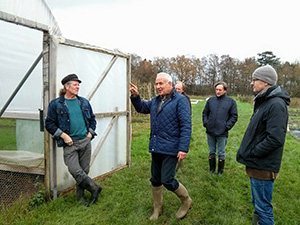
Code : 2017-24
Contract Period : 01/05/2018 - 30/04/2020
Main Funder : Ekhaga Foundation, Sweden
ORC Staff Contact : Anja Vieweger

This project uses participatory approaches to work with the established network of example farms in the UK, Germany and Austria to jointly develop a set of criteria (a) for farm health measurement and (b) for practical knowledge multiplication.
A major concern in food systems today is the increased contamination with pesticide residues, resistant pathogens and other harmful chemicals and microorganisms from agricultural production or processing. A recent report by the European Food Safety Authority (EFSA) showed that nearly 44% of all European food tested positive for pesticide residues. However, the health and nutritional value of agricultural food products is strongly linked to, and inherently depended on the production process and farm system in which the crop is grown, or the animal is raised etc. One of the four guiding principles of organic agriculture is the aim to promote health on all levels of the farming system. Since health concerns also constitute a main reason for consumers to buy organic products, ‘health’ is a topic of utmost importance for the organic sector.
Although there are currently only limited options for transferring and measuring farm-health principles at the farm level, an international group of farmers have collaborated to jointly express principles of how they achieve health on their organic farms. There is a need now to develop tools for transferring this tacit knowledge, and for monitoring and assessing health effects on organic farms; thereby helping farmers to reflect on the potential ways to improve health, but also helping research to identify general drivers of good farm health.
This proposed project will use participatory multi-actor approaches to work with the established network of good practice example farms in different European countries to jointly develop a set of criteria (a) for farm health measurement and (b) for practical knowledge multiplication. The interdisciplinary group will didactically develop the farmer principles further and conceptualise tools for health assessment and measurement of best practice outcomes on farms. Such a set of ‘criteria’ or ‘properties’ of a healthy farming system will be tested and validated by application on three organic farms in Europe, and will also enable the identification of future beacon farms, in different countries and environments. In a second step, the project will coach, provide scientific support and assist farmer-to-farmer learning by developing a variety of stable-schools, workshops or other training events by the example farms. Through these events with a wide range of farmers in different countries, the health criteria and health measurement concept/tool will be under continuous adaptation and refinement. This will allow a flexible integration of farmer knowledge and experience and the identification of criteria for the successful transfer of complex knowledge of farm health management.
Some of these formerly identified farmers’ principles of health are in fact well known, in line with the IFOAM principles of organic agriculture and already commonly accepted by the organic and agro-ecological farming sector (e.g. soil health is the base for health in the entire farm system). However, a number of ‘new’ principles have been defined by the farmer groups of the project, principles which are normally not often addressed and spoken about in the sector, and which are not yet communicated and explicitly stated as guidelines for organic farmers. These were identified by the farmers to be of particular importance and they include ‘softer’ and more holistic approaches such as:
Our approach to taking this work further will follow the aims below:
Project leader
The main output of the first project year will be:
The interactive and collaborative farmer knowledge exchange events during the second project year will further improve the health assessment approach on farms, refine the criteria of farm system health and review/feedback on the effectiveness and usefulness of this farmer learning methodology. Collected data and all qualitative information from the initial farmer meeting, the three farm school events, as well as the final farmer meeting with external experts will be analysed and will contribute to the overall results and output of the project, as well as its various publications.